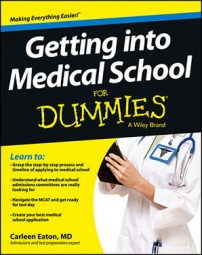If either your overall or science GPA isn’t up to par, getting admitted to medical school will be extremely difficult. When applying to medical school, even a strong MCAT score and extensive extracurricular activities may not be enough to compensate for a weak GPA.
For students who initially apply to medical school at the end of their junior year but aren’t accepted, senior year provides more opportunities to get great grades and increase their GPAs before reapplying. However, if a single year of good grades isn’t enough to bump you into the competitive range, or if you’ve already finished college, taking courses after graduation as a post-baccalaureate or graduate student may be necessary.
The term post-baccalaureate program (or post-bac) refers to two distinct types of programs, which causes some confusion:
Career changers: Post-bacs for career changers are intended for individuals who have graduated from college but haven’t completed the prerequisite courses needed for medical school. Students in career changer programs may be recent college graduates with non-science degrees or working professionals who graduated many years ago and pursued another career before switching to pre-medicine.
Academic record enhancers: Academic record enhancers allow med school applicants who’ve already completed their core science courses a chance to strengthen their academic records. These programs offer a second chance for applicants who didn’t perform well in their science courses during college.
Some programs include only undergraduate-level courses, while others consist of graduate-level work and lead to a master’s degree. The latter are often referred to as special master’s programs or SMPs.
Post-baccalaureate programs with undergraduate-level course work
Some post-baccalaureate programs focus exclusively on undergraduate courses. The emphasis is usually on upper-level courses such as physiology, anatomy, molecular biology, and other classes recommended but not necessarily required for medical school. However, students may also have the opportunity to repeat core science courses that they performed poorly in as an undergraduate before they move on to more-advanced courses.
Because these classes are undergraduate level, they’re factored in as part of the undergraduate overall and science GPAs when GPAs are calculated as part of the primary application.
Post-bac programs range from full-time, highly-structured programs that include academic advising, a committee letter of recommendation, and MCAT preparation to much more loosely organized setups that you can complete on a part-time basis and that offer little in the way of support services. Many structured programs provide a certificate of completion to those who complete a specific set of classes or number of units.
Some of these programs are very costly and competitive, where successful applicants have strong MCAT scores and GPAs of around 3.2. Others are less competitive and accept applicants with GPAs below 3.0 (although usually not below 2.75) and relatively low MCAT scores.
You can find a list of post-bac programs, including SMPs, at the American Association of Medical Colleges. The admissions cycle for many post-bac programs opens in January, although some accept applications as early as September. Deadlines for submitting applications typically fall between March and June, but it’s always best to apply early.
Special master’s programs (SMPs)
SMPs offer students the opportunity to strengthen their science backgrounds by taking courses at the graduate level and earning a master’s degree. However, SMPs are different than a typical graduate program in a science discipline, which are research-focused, require a thesis, and are designed to prepare students for a career in that field of study.
By contrast, SMPs are specifically tailored to students seeking to enter the health profession. They offer graduate-level course work that is similar to or the same as what students encounter in medical school. At some programs, SMP students even take classes right alongside medical students at the institution’s medical school.
SMPs may take one or two years to complete and are usually full time. Like their counterparts offering undergraduate-level courses, these programs may include premedical advising, a committee letter, and other support services.
The grades received in SMP courses aren’t included in the undergraduate GPA on the primary application; rather, they go toward a separate graduate GPA. Strong performance in a graduate program can overcome a weak undergraduate GPA, but if your undergraduate science GPA is very low (such as below a 3.0), your best bet may be to focus on improving your undergraduate GPA rather than going on to an SMP.
Taking classes independently
Strengthening your academic record doesn’t necessarily require signing on as part of a structured program. Instead, consider open enrollment or extension courses offered by a local university.
One major obstacle that you may face as an academic record enhancer student going it alone is finding available upper-level science classes, so you may need to attend classes at two colleges in order to find classes in the right subjects. Simply retaking core courses won’t impress the medical schools and isn’t worthwhile unless you originally received a C– or below in the course.
Master of Public Health: A good option?
Although attaining a Master of Public Health (MPH) can be good for students who have strong undergraduate GPAs and want to spend their gap year building their credentials in an area complementary to medicine, it’s rarely the best choice for those who need to improve their academic standing in order to gain admission to medical school.
Most MPH courses are in health policy, environmental health, social and behavioral sciences, health administration, or other subjects that med schools don’t count as science courses for the purposes of GPA calculations. If you need to improve your science GPA, the best bet is usually a post-bac or SMP intended for that purpose rather than a masters in health policy, or global health degree.

